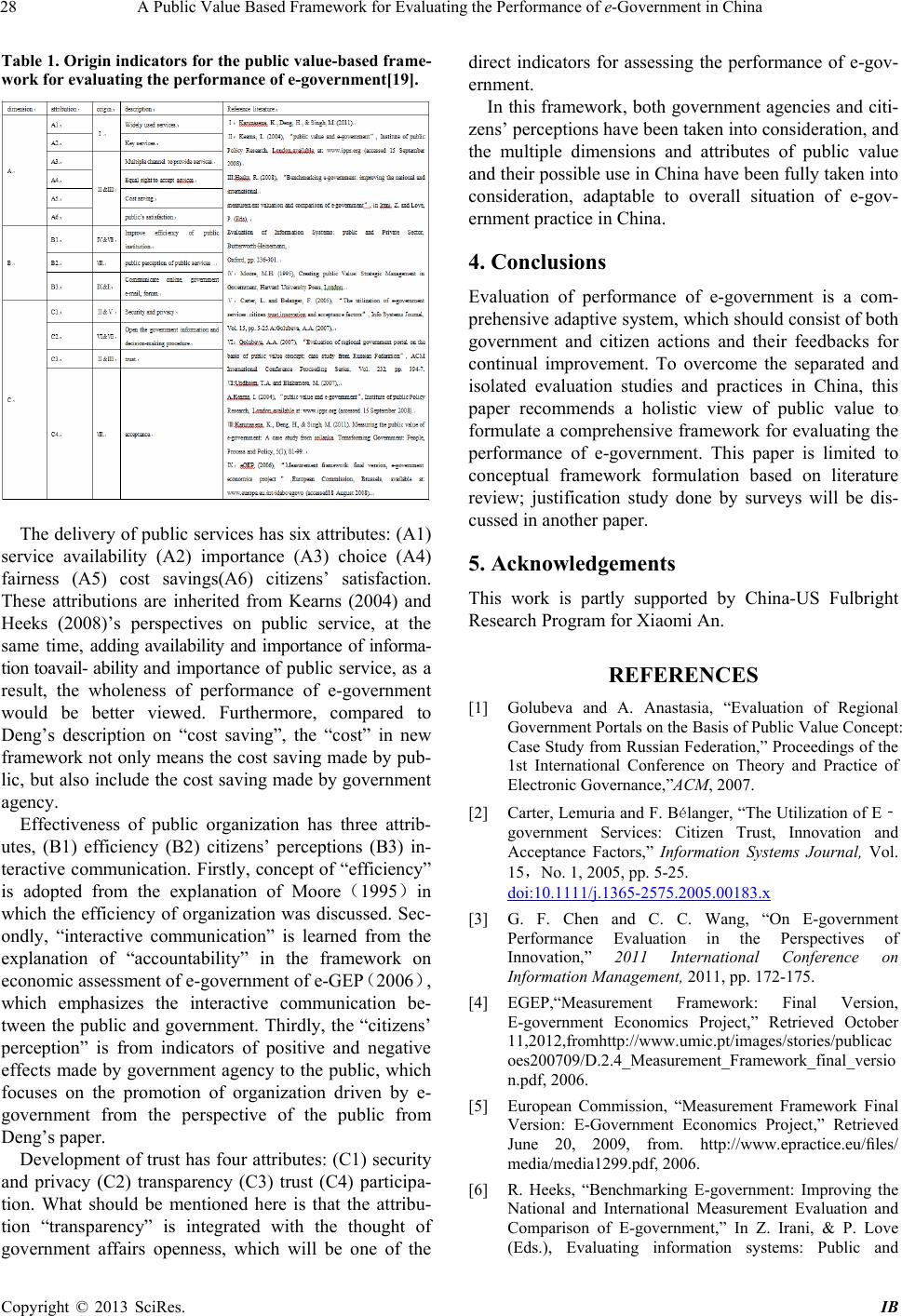
A Public Value Based Framework for Evaluating the Performance of e-Government in China
28
Table 1. Origin indicators for the public value-based frame-
work for evaluating the performance of e-government[19].
The delivery of public services has six attributes: (A1)
service availability (A2) importance (A3) choice (A4)
fairness (A5) cost savings(A6) citizens’ satisfaction.
These attributions are inherited from Kearns (2004) and
Heeks (2008)’s perspectives on public service, at the
same time, adding availability and importance of informa-
tion toavail- ability an d imp orta nce o f pu blic servic e, a s a
result, the wholeness of performance of e-government
would be better viewed. Furthermore, compared to
Deng’s description on “cost saving”, the “cost” in new
framework not only means the cost saving made by pub-
lic, but also include the cost saving made by government
agency.
Effectiveness of public organization has three attrib-
utes, (B1) efficiency (B2) citizens’ perceptions (B3) in-
teractive communication. Firstly, concept of “efficiency”
is adopted from the explanation of Moore(1995)in
which the efficiency of organization was discussed. Sec-
ondly, “interactive communication” is learned from the
explanation of “accountability” in the framework on
economic assessment of e-government of e-GEP(2006),
which emphasizes the interactive communication be-
tween the public and government. Thirdly, the “citizens’
perception” is from indicators of positive and negative
effects made by government agency to the public, which
focuses on the promotion of organization driven by e-
government from the perspective of the public from
Deng’s paper.
Development of trust has four attributes: (C1) security
and privacy (C2) transparency (C3) trust (C4) participa-
tion. What should be mentioned here is that the attribu-
tion “transparency” is integrated with the thought of
government affairs openness, which will be one of the
direct indicators for assessing the performance of e-gov-
ernment.
In this framework, both government agencies and citi-
zens’ perceptions have been taken into consideration, and
the multiple dimensions and attributes of public value
and their possible use in China have been fully taken into
consideration, adaptable to overall situation of e-gov-
ernment practice in China.
4. Conclusions
Evaluation of performance of e-government is a com-
prehensive adaptive system, which should consist of both
government and citizen actions and their feedbacks for
continual improvement. To overcome the separated and
isolated evaluation studies and practices in China, this
paper recommends a holistic view of public value to
formulate a comprehensive framework for evaluating the
performance of e-government. This paper is limited to
conceptual framework formulation based on literature
review; justification study done by surveys will be dis-
cussed in another paper.
5. Acknowledgements
This work is partly supported by China-US Fulbright
Research Program for Xiaomi An.
REFERENCES
[1] Golubeva and A. Anastasia, “Evaluation of Regional
Government Portals on the Basis of Public Value Concept:
Case Study from Russian Fede ration,” Proceedings of the
1st International Conference on Theory and Practice of
Electronic Governance,”ACM, 2007.
[2] Carter, Lemuria and F. Bélanger, “The Utilization of E‐
government Services: Citizen Trust, Innovation and
Acceptance Factors,” Information Systems Journal, Vol.
15,No. 1, 2005, pp. 5-25.
doi:10.1111/j.1365-2575.2005.00183.x
[3] G. F. Chen and C. C. Wang, “On E-government
Performance Evaluation in the Perspectives of
Innovation,” 2011 International Conference on
Information Management, 2011, pp. 172-175.
[4] EGEP,“Measurement Framework: Final Version,
E-government Economics Project,” Retrieved October
11,2012,fromhttp://www.umic.pt/images/stories/publicac
oes200709/D.2.4_Measurement_Framework_final_versio
n.pdf, 2006.
[5] European Commission, “Measurement Framework Final
Version: E-Government Economics Project,” Retrieved
June 20, 2009, from. http://www.epractice.eu/ files/
media/media1299.pdf, 2006.
[6] R. Heeks, “Benchmarking E-government: Improving the
National and International Measurement Evaluation and
Comparison of E-government,” In Z. Irani, & P. Love
(Eds.), Evaluating information systems: Public and
Copyright © 2013 SciRes. IB